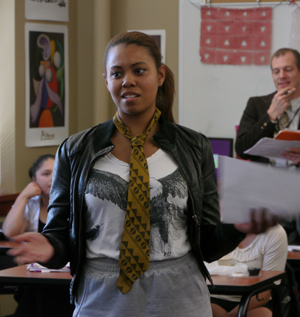The ingredients were all there: a movie mogul with a mission, University of Washington faculty with expertise and new ideas, and a school district willing to think outside the box.
With these ingredients, Knowledge in Action was launched in 2008, aimed at enhancing student learning in a high school advance placement (AP) course, US Government and Politics. The project recently received an Exemplary Research in Social Studies Award from the National Council for the Social Studies, for a Journal of Curriculum Studies article about the project.

Knowledge in Action can be traced back to acomputer-based teaching simulation developed at the UW. John Wilkerson, UW professor of political science, created LegSim to simulate the complex process of passing legislation in US Congress, with students assigned specific roles and responsibilities. Bellevue High School teacher Don Myers and Bellevue School District curriculum adviser John Brill saw possibilities for adapting LegSim to high school AP government courses.
That’s where the movie mogul comes in. Thanks to support from the George Lucas Education Foundation (Edutopia), the Bellevue School District was able to completely rethink its AP US Government and Politicscourse, using LegSim as its inspiration. “George Lucas is very interested in project-based learning,” explains Walter Parker, UW professor of social science education and adjunct professor of political science. “He remembers high school as being no fun and inauthentic. Having had a bad experience himself, he created the foundation to improve high school learning.”
It’s not uncommon to add projects to a course, but to drive a course through projects—that takes some doing.
With the foundation’s support, a team of UW researchers—Wilkerson, Parker, and College of Education faculty Susan Mosborg, John Bransford, Nancy Vye, and Robert Abbott—worked closely with Bellevue School District AP teachers to design a new approach to teaching AP US Government and Politics that would more actively engage students and deepen their learning. Projects are the spine of the revised course, from which everything else follows. “It’s not uncommon to add projects to a course,” says Parker, “but to drive a course through projects—that takes some doing.”
The approach is particularly challenging when a course ends with a nationally administered AP test that emphasizes breadth of content. “If you’re doing project-based learning, there’s less time for content,” explains Wilkerson. “You have a depth-versus-breadth trade-off. But what the students learn, they learn well.”

Class activities include a LegSim-based project through which students propose and debate legislation, a role playing game in which students argue a case before the Supreme Court, a task force through which students advise a nation moving from dictatorship to democracy, and other hands-on projects. Engaging students through projects before presenting background information through texts and lectures—the reverse of the usual approach—has led to better information retention. And through a technique known as looping, key questions and ideas are revisited and reinforced.
“The key to using looping is to know what to repeat,” explains Parker. “It has to be so central that it’s going to pay off. If we revisit certain key issues in each project, they serve as fuel. They throw fertilizer on the rest of the content.”
Throughout the program’s first year, it was clear that students were engaged with the course content. The looming question was whether the approach would translate to a positive performance on the national AP test. “In the past, there was the belief that project-based learning worked, but the evidence was not based on well-designed studies,” says Parker. “Here was a chance to do project-based learning where the measures were gold standard, credible, and broadly respected.”
As it turns out, Knowledge in Action students performed better on the AP test than their peers. “They did particularly well on the essay, because they were able to see the connections between the things they’d learned,” says Wilkerson.
The program has expanded to include high schools in three states, with an emphasis on urban schools with limited resources. They include four schools in Seattle, five in Des Moines, Iowa, and a charter school network in Oakland, California.
The program continues in Bellevue as well. What began as an experiment in a few classrooms at Bellevue High School has been adopted more widely in the Bellevue school system, extending beyond American government courses to other subjects.
“Bellevue has really flown with this,” says Parker. “The approach has really blossomed there.”
For more about Knowledge in Action, visit the project page on the Edutopia website.
More Stories

AI in the Classroom? For Faculty, It's Complicated
Three College of Arts & Sciences professors discuss the impact of AI on their teaching and on student learning. The consensus? It’s complicated.

A Sports Obsession Inspires a Career
Thuc Nhi Nguyen got her start the UW Daily. Now she's a sports reporter for Los Angeles Times, writing about the Lakers and the Olympics.

A Healing Heart Returns
In February, the UW Symphony will perform a symphony that Coast Salish elder Vi Hilbert commissioned years ago to heal the world after the heartbreak of 9/11. The symphony was first performed by the Seattle Symphony in 2006.